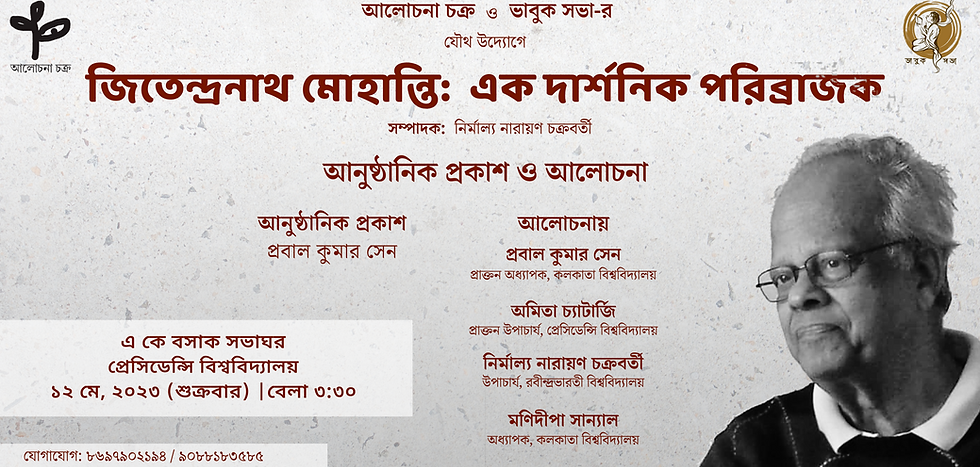Book Discussions
বই প্রকাশ, পাঠ ও আলোচনা
In our book discussion sessions, we organize panel discussions and initiate debates and conversations about recent or upcoming publications, both in English and Bengali. Our sessions bring forward comments from authors, editors and audience, stimulating a holistic conversation around contemporary critical texts.



Subalterns in History, Subaltern Histories
An adda with Profs. Saurabh Dube, Ishita Banerjee Dube and Robert Curley
On 15 March, 2024, we had Profs. Ishita Banerjee-Dube (El Colegio de México), Saurabh Dube (El Colegio de México) and Robert Curley (University of Guadalajara) with us for a discussion session on their upcoming edited volume, the Routledge Handbook of Subalterns Across History. This book emerges from a conversation with the Subaltern Studies collective led by historian Ranajit Guha and seeks to expand beyond the scope of the collective—in terms of what the subaltern entails, and the geographical and historical enquiry of the subaltern. In the session, Prof. Dube introduced their project, while Prof. Banerjee-Dube expanded on the range of questions and concerns that drives the project; Prof. Curley elaborated on the methods and contexts of studying subalternity in Mexico, as a case study of the global examination of the subaltern that the volume undertakes.
Observing the wider shifts in the mappings of the subaltern as subject over the last few decades, the Handbook aims to not simply showcase these paradigm shifts but to contemplate on the implications of such changes in the Humanities, in a rapidly transforming social world. The editors stated how their own coming of age involved reading and reflecting on the works of the Subaltern Studies collective, which were being published at the time. Consequently, their present project questions the distinct, concrete idea of the subaltern and the subaltern consciousness which, as eventually members of the collective also stated, could not find its image in the evolving social reality. At the same time, it contemplates on the fundamental and persistent need to explore subaltern voices across the globe, interrogating collectives and methods across global academia. The project undertakes a study of peoples, communities, religions, regions and perspectives, that have been historically overlooked, and brings forth new perspectives on collective rights. Prof. Ishita Banerjee-Dube particularly emphasized on the resistance of the subaltern through various modes such as religion. Prof. Curley spoke about thinking together with and beyond existing models of Marxism, postcolonialism, history from below and so on. Introducing the Subaltern Studies collective in Latin America, and pointed out the impossibility of direct translation and transition of theories from one society to another due to differences in societal structures. At the same time, he emphasized on the importance of transregional discussions and connections, and of dialogic processes. In the light of the twentieth-century shifts in the ideas of citizenship, democracy, rights, resistance and social justice, the Handbook of Subalterns project aims to extend the notion of the subaltern as political subject, and advocates collaborative ethnography, engaging in a dialogue with subaltern individuals, regions and communities rather than approaching a fixed idea of the subaltern.
The discussions led by the speakers initiated a long interaction with the students, with numerous, engaging questions and thought-provoking answers. Discussions ranged from issues of subalternity and religion, interacting realms of the elite and the subaltern, the need to perceive the subaltern in relational terms rather than fractured, autonomous categories, subalternity and politics, performance, ontology and representation, and approaching subaltern histories as well as subjects. The session was moderated by Olivia Banerjee (Dept. of Sociology, PG-I) and Gayatri Paul (Dept. of Sociology, UG-II), and concluded with a vote of thanks by Rubai Islam (Dept. of Sociology, UG-III). The discussions spilled over beyond the classroom, with a hearty adda over tea and snacks.


